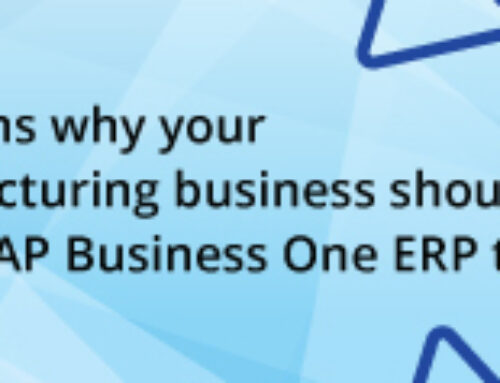How ERP systems can drive sustainability in your business
Sustainability is critical to companies in every industry, as measures taken to move positively in this direction can help reduce the negative environmental impact resulting from their operations and can give them a competitive advantage.
An ERP system is often associated with streamlining operations and improving efficiency, but it can also be used to drive sustainability initiatives. By integrating sustainability into your business operations with an ERP system such as SAP Business One, you can boost production efficiency, reduce cost and waste, improve supply-demand planning, and drive greater organizational effectiveness, all while also reducing your environmental impact and creating a positive impact on society.
Streamlining operations
ERP systems can help businesses streamline their operations by automating repetitive tasks and eliminating manual processes. This can lead to significant reductions in the consumption of resources such as paper, energy, and water, which are often used in manual processes. By streamlining operations, an ERP System such as SAP Business One, designed specifically for the SME sector, can help businesses reduce their environmental footprint and move towards a more sustainable future.
Supply chain management
ERP systems can help businesses control and manage their stock more efficiently, which can lead to a reduction in emissions and waste. Purchasing and planning functionalities in SAP Business One ERP, can give granular visibility to available raw material, intermediate and finished goods inventory, as well as current batch production jobs. This can help businesses employ economies of scale to purchase raw materials and schedule batch production jobs to meet forecasted demand. Forecasting tools help you plan better so that you can avoid excess inventory taking up storage space or wastage that happens due to overproduction.
Functionalities in SAP Business One, such as FIFO (First In, First Out), LIFO (Last In, First Out), or in the case of the F&B industry, FEFO (First Expired, First Out) configured on inventory management systems, help businesses utilize stock which is either produced first or which has the first expiry date so as to minimize wastage which eventually leads to loss of revenue and higher carbon emissions.
Quality control and maintenance functionalities in SAP Business One help establish a comprehensive QA and maintenance program so that your customers are ensured delivery of quality products and your business has a clear preventative maintenance program so that you can avoid costly equipment failures, which also help you avoid rejected or wasted goods or wasted time. Both can contribute negatively to your sustainability efforts.
Cloud Hosting
SAP Business One ERP can be hosted on cloud also, which can help the environment as well as your business. Your business can save costs associated with on-premise hardware as well as the manpower required to maintain it. The cloud gives you flexibility with your usage and the potential to scale up or down as and when required. You also reduce your businesses’ carbon impact when you do not have your own data centre. Larger cloud providers can make their data centres much more efficient than you would with your own data centre.
Again, this means lower costs of ownership for you as well as a positive impact on the environment.
Analytics for optimal planning
ERP systems can use predictive analytics to forecast resource consumption and identify potential issues before they arise. By using historical data, and comparing with current real time data, businesses can predict future trends and take proactive measures to ensure that they are optimising their production schedules to reduce wastage of resources and manpower.
Real-time data for business agility
SAP Business One ERP’s ability to provide visibility into real time data means that businesses can plan, and change strategy as needed. They can change plans so as to optimize use of resources so that they are better allocated and utilized. ERP systems can also give you analysis on which business processes need to be optimised so that they generate more returns and are not a burden to the company. Resource draining processes are a burden not only to the business but also to our planet.
In conclusion, ERP systems such as SAP Business One, can play a significant role in helping businesses move towards a more sustainable and greener future. By streamlining operations, tracking resource consumption, managing supply chains, generating sustainability reports, and using predictive analytics, businesses can not only increase their efficiency and profitability but also reduce their environmental footprint, improve their sustainability performance, and demonstrate their commitment to sustainability to stakeholders.
On this #EarthDay let’s incorporate sustainability into our business practices through ERP software, and make a positive impact on society to create a more sustainable future.


